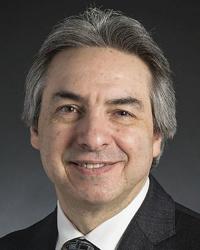Loading Complete

Angelo Michael Demarzo, MD, PhD
Pathology
Johns Hopkins Affiliations
- Johns Hopkins School Of Medicine Faculty
32 Insurances Accepted
View allAbout
Professional Titles
Primary Academic Title
CV
Background
Additional Academic Titles
Research Interests
Research Summary
Google Scholar
PubMed
Selected Publications
Memberships
Locations
- The Johns Hopkins Hospital
- 1800 Orleans Street, Baltimore, MD 21287
- phone: 410-955-5000
- fax: 410-955-5001
Expertise
Education
Johns Hopkins University School of Medicine
Fellowship, 1998Johns Hopkins University School of Medicine
Residency, Pathology, 1997Anschutz Medical Campus
Medical Education, MD, 1994University of Colorado School of Medicine
Graduate School, PhD, 1993Board Certifications
Anatomic Pathology
American Board of Pathology, 1988Insurance
Johns Hopkins providers participate in many commercial health insurance plans. To confirm coverage of your specific physician or provider, please contact your insurer directly. For more details, please review our Insurance Information.
Search plans
- Aetna
- Amerigroup District of Columbia
- AmeriHealth Caritas District of Columbia
- Beech Street
- Blue Cross Blue Shield Federal Employee Program (FEP)
- CareFirst
- Cigna
- Evernorth Behavioral Health
- First Health
- Geisinger Health Plan
- HealthSmart/Accel
- Humana
- JAI Medical Systems
- Johns Hopkins Health Plans
- Kaiser Permanente
- KeyCare
- Maryland Physicians Care
- Medicaid Maryland
- Medicaid Virginia
- Medicare Maryland
- MedStar Family Choice District of Columbia
- MultiPlan
- Pennsylvania's Preferred Health Networks (PPHN)
- Point Comfort Underwriters
- Private Healthcare Systems (PHCS)
- Provider Partners Advantage HMO SNP Medicare Advantage
- South Central Preferred (SCP)
- Superior Vision
- TRICARE (Humana Military East)
- UnitedHealthcare
- Veteran Affairs Community Care Network (Optum-VACCN)
- Wellpoint (Amerigroup MD)
